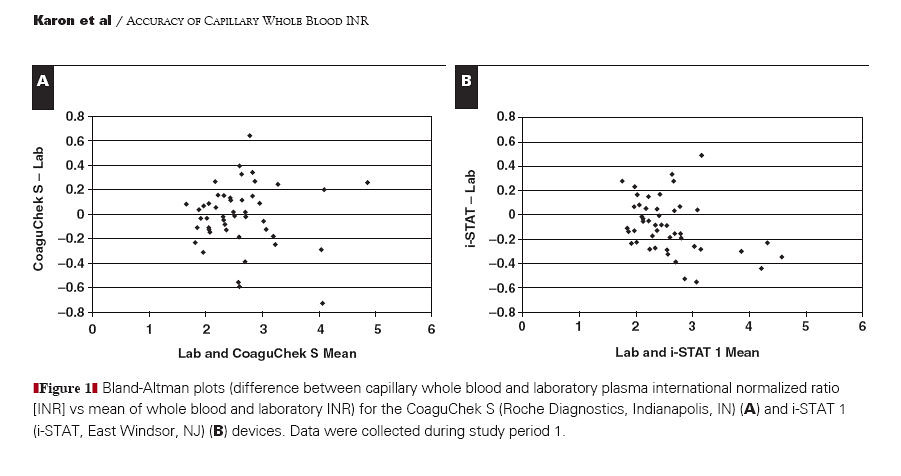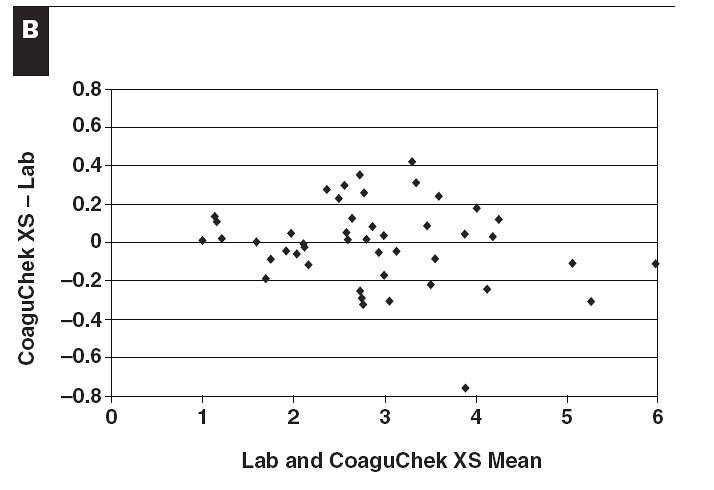I'm repeating a frustration that I sometimes run into when the issue of INR accuracy comes up.
A year or so ago, when I was still using the InRatio, I was getting results on the InRatio that were higher - often considerably higher - than the labs. When I asked them which I should trust (meter or lab), they told me to 'trust the lab.'
I've put my trust in the hospital lab that is associated with the clinic where I occasionally get a finger stick, instead of a monthly blood draw. I've had my blood tested at a general medical clinic and gotten a result that was many points higher than the hospital lab (and the tests were done within hours of each other).
For more than a year, I've tested with my meters within hours of my tests at the hospital lab, or by the Hemochron meter at the Anticoagulation Clinic.
I trust the hospital lab as the source of (probably) the most accurate INR. I trust my Coag-Sense meter to be slightly lower (usually .2 or .3 lower) than the hospital lab. I've been pretty comfortable with this scenario. When my CoaguChek XS strips expired, I didn't rush out to get new ones -- although it would be nice to compare the lab to the two meters, and the meters to each other between blood draws, I'm comfortable with just the Coag-Sense.
I recently got a Hemochron - and only one test strip. The Hemochron is one that is used in operating rooms to test INR and other blood factors. It's one that hospitals put their faith in. My Hemochron passed the electronic quality control tests.
Here's my dilemma:
I went to the Anticoagulatin clinic this morning, and their Hemochron gave a result of 4.0. This was surprising to me --- my Coag-Sense on Monday (four days ago) gave me a 2.8. Although it's possible for the INR to go from 2.8 to 4.0 so quickly (maybe through double-dosing on warfarin, for example), it seemed a bit odd that my INR would jump to a 4.0 so quickly. I assured the clinic nurse that I'll eat some leafy greens. Although I told her that 1/2 dose (or no dose - her first suggestion) wouldn't have any effect on my INR a week from now, I accepted her claim that it would.
I came home a few hours later and tested on my machines. Here's the summary:
Lab Hemochron - 4.0
MY Hemochron -- 3.4
MY Coag-Sense - 3.1
Assuming that the Hemochron is 'lab accurate' and that my Coag-Sense is often about .1 - .3 lower than the labs, the results on my meters are consistent with what I expect that my INR ACTUALLY is. The minimal spike of 0.3 from what it was four days ago (without any diet or acivity changes) is also more consistent with the big jump on the clinic's meter.
The clinic nurse insisted that their meter is calibrated and carefully matched to the lab's values.
Without a blood draw to answer this, the question is this:
Do I trust the Clinic's value, which seems somewhat illogical, based on my INR four days ago and my tests at home on a similar machine. Or do I trust my two machines as being more accurate?
Do I add a little stress to my life because my INR is in a somewhat uncomfortable range, or do go on living relatively normally with an INR below 3.5?
(Of course, if I was the usual patient, and had total faith and reliance in the accuracy of the clinic, I would blissfully follow their recommendations, and not even be concerned with the accuracy of their testing. Sometimes it's not easy to know enough to question the experts).
For myself, I haven't changed my life style except to probably add some greens and avoid situations that may result in bruising. I'll maintain my coumadin dose. I trust my meters more than I do the one at the clinic.
DO YOU AGREE with my conclusion? What would YOU do, given the same results?
A year or so ago, when I was still using the InRatio, I was getting results on the InRatio that were higher - often considerably higher - than the labs. When I asked them which I should trust (meter or lab), they told me to 'trust the lab.'
I've put my trust in the hospital lab that is associated with the clinic where I occasionally get a finger stick, instead of a monthly blood draw. I've had my blood tested at a general medical clinic and gotten a result that was many points higher than the hospital lab (and the tests were done within hours of each other).
For more than a year, I've tested with my meters within hours of my tests at the hospital lab, or by the Hemochron meter at the Anticoagulation Clinic.
I trust the hospital lab as the source of (probably) the most accurate INR. I trust my Coag-Sense meter to be slightly lower (usually .2 or .3 lower) than the hospital lab. I've been pretty comfortable with this scenario. When my CoaguChek XS strips expired, I didn't rush out to get new ones -- although it would be nice to compare the lab to the two meters, and the meters to each other between blood draws, I'm comfortable with just the Coag-Sense.
I recently got a Hemochron - and only one test strip. The Hemochron is one that is used in operating rooms to test INR and other blood factors. It's one that hospitals put their faith in. My Hemochron passed the electronic quality control tests.
Here's my dilemma:
I went to the Anticoagulatin clinic this morning, and their Hemochron gave a result of 4.0. This was surprising to me --- my Coag-Sense on Monday (four days ago) gave me a 2.8. Although it's possible for the INR to go from 2.8 to 4.0 so quickly (maybe through double-dosing on warfarin, for example), it seemed a bit odd that my INR would jump to a 4.0 so quickly. I assured the clinic nurse that I'll eat some leafy greens. Although I told her that 1/2 dose (or no dose - her first suggestion) wouldn't have any effect on my INR a week from now, I accepted her claim that it would.
I came home a few hours later and tested on my machines. Here's the summary:
Lab Hemochron - 4.0
MY Hemochron -- 3.4
MY Coag-Sense - 3.1
Assuming that the Hemochron is 'lab accurate' and that my Coag-Sense is often about .1 - .3 lower than the labs, the results on my meters are consistent with what I expect that my INR ACTUALLY is. The minimal spike of 0.3 from what it was four days ago (without any diet or acivity changes) is also more consistent with the big jump on the clinic's meter.
The clinic nurse insisted that their meter is calibrated and carefully matched to the lab's values.
Without a blood draw to answer this, the question is this:
Do I trust the Clinic's value, which seems somewhat illogical, based on my INR four days ago and my tests at home on a similar machine. Or do I trust my two machines as being more accurate?
Do I add a little stress to my life because my INR is in a somewhat uncomfortable range, or do go on living relatively normally with an INR below 3.5?
(Of course, if I was the usual patient, and had total faith and reliance in the accuracy of the clinic, I would blissfully follow their recommendations, and not even be concerned with the accuracy of their testing. Sometimes it's not easy to know enough to question the experts).
For myself, I haven't changed my life style except to probably add some greens and avoid situations that may result in bruising. I'll maintain my coumadin dose. I trust my meters more than I do the one at the clinic.
DO YOU AGREE with my conclusion? What would YOU do, given the same results?


























